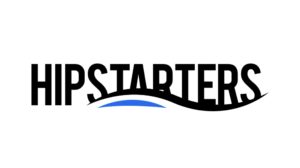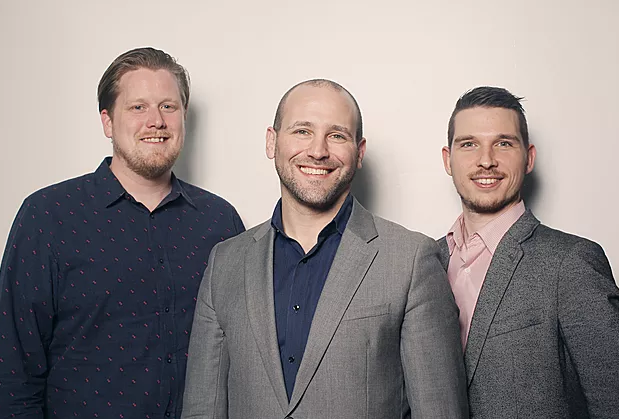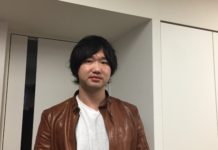Not all Japanese companies are founded by Japanese. Moneytree, a Tokyo-based Japanese company founded by two Americans and an Australian, is set on a mission to change how personal finance management is done, aiming to be the first Japanese Fintech to go overseas. Winning Best App of 2013 and 2014 on the Apple store, previously unheard of for a Japanese app, Moneytreedemonstrates innovation in Fintech coming out of Japan, with potential applications in global markets as well.
I met with Chief of Marketing, Zach Taub, and Senior Marketer, Kenzo Yamaguchi, to chat about their company’s plans for revolution, influences, and favorite hangout spots in Tokyo.
– Please tell us about your company.
Taub: Moneytree was started in 2012. We have 3 founders—Paul Chapman, Ross Sharrott, and Mark Makdad. They bootstrapped for about a year working in a small office in Shibuya and released the app in 2013. They also moved office to our current location in Harujuku in July of the same year.
Our three tiers of service are B to C, B to SMB and B to E. B to C, is our consumer facing, personal finance management (PFM) app called Moneytree. B to SMB, the premium tier inside of the app, includes mobile expenses management and support for Japanese corporate account data aggregation in the cloud—since Japanese corporate bank accounts are electronic certificate backed and limits downloads to one account per machine, our unique solution allows us to do this securely in the cloud where accounts never go to the devices and are never exposed to the outside world. Our solution ensures secure data protection and allows accounts to be viewed from multiple devices, accessible on the desktop app, Moneytree for web, or iOS app.
For the B to E aspect, we discovered in early 2015 that many companies needed data aggregation capabilities and wanted access to a platform like ours. We are like a very tiny AWS; we built a platform to support our offering and have the ability to license our capabilities out to third parties. The first client on that platform was Yayoi, the number one in consumer and SMB tax preparation in Japan. We later named this platform “MT LINK”, which allows you to import all the data you stored in Moneytree into your tax preparation software. Yayoi has their own proprietary categorization system, so they’ll take all info that is cleansed and categorized according to tax codes set in the app, and populate the info into their form. This reduces tax preparation time by 60-70%, which is a huge advancement in efficiency. After that, we were able bring on TKC, the largest provider of tax software solutions to accountants, on to the platform as well. We are currently the number one data partner for accounting software in Japan. On top of that, we have announced 15 companies on the platform and have a few more to announce in the coming months.
We are aggressively looking to grow outside of Japan which is one the reasons we are going to be a Finovate Asia on November 8th. We are the only company from Japan that is presenting this year. Other events we participated in were TechAsia Tokyo, FIBC (Financial Innovation Business Conference), Pioneers Asia, and the Fintech Summit which happen a few weeks ago. We are confident to be the first Japanese Fintech to go overseas.
– Please tell us about your background.
Taub: I’m an early joiner to the company. I used to work for Adidas and left in early 2013. I did some consulting work afterwards and got introduced to the Moneytree guys a couple of weeks before they launched the app. I mentored them for 6 months after which they brought me on as a retained consultant. Ijoined full time in 2014.
Yamaguchi: I have been here since the beginning. I use to run a company with a designer who now works for Moneytree as well. Paul found our company and eventually invited us to join them after he saw our designs. Basically started from zero in 2012 and saw the app through its initial release. The company started with 7 people in the first year and is currently now at 24 employees.
Regarding the founders, they all used to work for Wall Street Associates (now En World), a recruitment company in Japan. Paul was the IT Manager, Mark was a Sales Consultant, and Ross, an Engineer Consultant. They were all friends and basically decided make a startup together. They went on to start a tech consulting firm and then eventually started Moneytree in 2012. They all come from a technical background, so they created the frontend and backend, while my partner and me focused on design. With cloud technology becoming more powerful, we are now able to manage the information of over 1 million users with only 24 employees. I believe the founders were able to create a successful startup, not only because their technical background, but also due to their ability to understand mobile devices and cloud trends.
Even though we received initial praise from Apple about our app, financial institutions didn’t want to give us the time of day at first. It wasn’t until “Fintech” became trendy that financial institutions and media outlets started picking up on Moneytree. Last October, IBM approved our finance API MT LINK for use on their Bluemix platform, which is a heavily trusted within financial institutions. It was great press for us, as this led to major financial institutions partnering with us, with Mizuho as the first mega-bank to join. We received funding from other mega-banks as well. Apart from our service, the fact Moneytree was a Japanese company founded by 3 non-Japanese people was another selling point for investors.
– I know on the website you mention having over 1 million users, but isn’t much more than that?
Yamaguchi: Though we can’t disclose on actual numbers of accounts within financial institutions that we service, install base figures are way over 1 million. Though people tend to focus on app downloads, we consider ourselves as a platform with no clear in competitor in Japan or elsewhere who is achieving our numbers. I believe that this is one of our strengths.
– There are other personal finance management apps out on the market like Moneyforward. Can you explain how Moneytree differs?
Yamaguchi: We are usually compared to Money Forward – first they provide PFM and Accounting solution called “MF Cloud”. Though we provide PFM like Money Forward, they cannot link to tax preparation companies like Yayoi. Our solution has the capabilities to link with any financial institution such as banks, securities, real estate, or accounting firms. Moneytree is free for users regardless of how many years you use the app or how many accounts you manage within the app.
Another difference on the PFM side is we don’t do database marketing. Protecting user privacy has been our top priority, so we are not involved in looking into or analyzing user data, nor selling ads. For example, we made it a rule from the beginning not to include banners in our app, as sensitive data could be collected or exposed in the backend. Also, we have confirmation screens that appear before any data transfer occurs between the app and financial institution to confirm if the user is aware of where their data is going. Just as iTunes makes song recommendations based on individual user data, we are only interested in using data for the purpose of benefiting the user directly.
I would say the number one reason why we have gained trust with many financial institutions is based on the fact our business model is built around protecting user privacy and security. We are seeing a trend set by Silicon Valley on how personal data is collected, protected, and used, and expect to see Japanese service providers modifying their business models to follow new legislation in the next 24 months.
– What other countries are you looking to expand to?
Taub: The only countries that we have disclosed at this point is Australia and New Zealand, entering late this year or early next year.
The app works in English or Japanese, so obviously the low hanging fruit for us would be English speaking countries in Asia. Asia could be our springboard off to larger markets, probably Europe. North America is a difficult and huge market to enter, but of course, anything is possible with the right partner. For now we are going to focus on organic growth in markets that are close to us.
– Any companies or investors are looking to partner up with?
Taub: Because Moneytree is an opt-in personal financial data sharing platform, it’s like OAuth with your money. “Do you want to get a loan? Sign in with Moneytree.” “Do you want to get a credit card? Sign in with Moneytree.” We could do your eKYC, identity verification, all those things, taking away the hassle if users allow us to. No one has managed to provide all those features under one umbrella in an interconnected platform–so that’s our goal. There are a lot of verticals that could use that information; banks, securities, insurance, practically anything that is financial adjacent.
If there are globally minded enterprises in North America, whether VC or Large Enterprise, interested investing in Asia, I would say to them that Fintech is far from finished. People in the US tend to have a bit of fintech fatigue, while the rest of the world is a couple of years behind. As Japan is a wait-and-see economy, Fintech’s relevance will be longer and deeper here than it has been in North America. My advice would be to keep your eye on what is happening here as there is a much longer time span. What is possible in other markets is not possible in Europe or this market, so there are many emerging opportunities in Asia alone.
– What is your day to day schedule like?
Taub: It’s probably not as erroneous as domestic Japanese companies. We are on flex-time, with core-time at 11:00 to 4:00. We have morning standup meetings two times a week on Monday and Thursday at 10:30. I try to get myself and team members in the office before 10:00 and are usually out at 7:00 or 8:00. Though this month is not that busy, September for us was kind of insane due to the amount of preparation needed for various events; we had an event at Apple Ginza, participated in the Nikkin FIT Forum , and two weeks after that, were at the Fintech Summit. On top that, we created an iOS messaging app with stickers for iOS 10 and Marketing had to do the press release and media for that ahead of the launch.
As far as work life balance is concerned, we are less concerned about how much time you take off versus how much work you deliver.
– As for the Founders, are they still hands on technically?
Taub: Yes, our CTO is still our Chief Architect, so he still digs into the code.
Mark, who is Head of Platform for MT LINK, is still very much involved in aggregation and implementation. Paul is the one with the least formal technical background and he still hacks away when necessary. As a company, we are all involved in testing. We are not that stratified and have about three layers: Board, Leadership, and everyone else. However, even with that, we are still pretty flat and all work for each other depending on the deliverables of each situation. Very hands on culture.
– Are there any apps that that you use on a daily basis?
Yamaguchi: We use Slack a lot in business. Other than that, we use LINE and Google tools/apps.
– Where are your favorite places to hangout?
Taub: I usually find myself hanging out in Aoyama, Minami Aoyama, and Ebisu. There are a lot of places you can drink for cheap in Shibuya as well. It’s kind of hard to go wrong in Tokyo, as places that aren’t good don’t last. For myself, my go to spot would be NOS in Ebisu. Another good area to explore is Sangenjaya.
Yamaguchi: I don’t drink, but went I go out with everyone, we usually go to TGIFridays or Daisuien (大炊宴) , an izakaya in Harujuku.
– Who are you or the founders influenced by the most?
Taub: The first has to be Steve Jobs.
Yamaguchi: Yes, personally I see Steve as the catalyst in revamping and redefining the mobile phone industry as well as a major influencer in product design.
Taub: Marc Newson and Shin Nishibori (designer of the iPhone 4) also top the list of designers we’ve been influenced by. Other than Apple, Sony has also been a major influence in the whole industry in terms of product design. The “taste, not trend” design concept is what we hope to demonstrate in our product as well.
Yamaguchi: Other than that, Shigeru Miyamoto from Nintendo, is also a key influencer. Taking Super Mario Bros as an example, the game layout he created allows first time players to easily pick up on how to play the game without a tutorial, which is phenomenal from a software design aspect.
Moneytree makes personal finance management user friendly, while providing users a peace of mind knowing their financial data is safe and secure. In a society where financial institutions are not traditionally not open to “foreign” solutions, Moneytree’s technical approach driven by its core values demonstrate the point that nationality does not matter if you have a great and reliable solution. We hope that Moneytree’s example not only facilitates new ideas in Fintech, but also inspires other foreign entrepreneurs to make a difference in Japan and throughout the world.



















